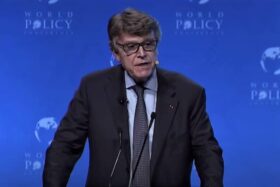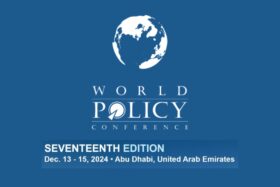See more on the You Tube channel of the World Policy Conference
The World Policy Conference that begins today is the tenth. As fate would have it, the first one, which began in Evian in October 2008, took place just a few days after Lehman Brothers went bankrupt, an event that has come to symbolise the deepest financial crisis the world had seen since the 1930s. The subprime crisis put an end to the epistemological error of thinking that the science of economics had reached a degree of perfection comparable to that of the exact sciences. Back then, more than one Nobel Prize winner believed that any country could win the sweepstakes — growth, full employment, price stability and balanced trade. It would soon be merely a matter of engineering, such as, for example, building a plane. Fortunately, as governments helplessly floundered looking for a solution, the small community of cool-headed central bankers, with their experience and pragmatism rooted in history, thwarted disaster. A decade has gone by and the global economy is showing new signs of life. Economic and financial governance has made substantial strides. But memories of ordeals and missteps quickly fade when normality and the lure of easy profits return. It becomes very tempting to ease up on regulations again. But we are not safe from the return of financial calamities. Since the first WPC, the world has also seen the outbreak and dramatic failure of the ill-named “Arab Spring”. Catastrophic policies based on American neo-conservative ideology led only to chaos, the intensification and spread of Islamist terrorism by groups like the self-proclaimed “Islamic State”, the massive growth of refugee flows and, around them, parasites who feed on collective misfortune. These disaster’s by-products include the rise of nationalism, even in Europe — although it should be pointed out that it also stems from other causes, directly related to poor governance and the Union’s over-hasty expansion after the fall of the USSR. History has at least three lessons to teach us: countries that toy with other States’ political regimes do so at their peril; each nation matures in its own way and at its own pace; and keeping the world reasonably open assumes that the main stakeholders will play by the rules. That is probably the most basic point of what is called “global governance” — a point that applies to every scale. Since the end of the Cold War, the Middle East has been one of the world’s regions where the game rules have been flouted the most blatantly. Restoring structural balance there will only be possible if the main stakeholders — including all of them without any ideological preconditions — share the desire to restore rules. From a global geopolitical standpoint, the main phenomenon in the past 10 years has been China’s self-assertiveness. Its ambitions are now out in the open. Under the strengthened rule of the Communist Party and its uncontested leader Xi Jinping, the world’s biggest country intends to overtake the United States by the time the People’s Republic commemorates its centennial in 2049. Meanwhile, it will look out for its national interests as scrupulously as the United States does for theirs. It will strive to turn the world game rules spelled out after the Second World War to its advantage, which will ruffle some feathers. Mainly in response to China’s rise, under Prime Minister Shinzo Abe’s authority, the world’s third-ranking economic power is gearing up to fully reclaim all the attributes of power. Everyone is aware that in East Asia, the immediate future hinges on North Korea, with the other main players: China, the United States, Japan, South Korea and Russia. I have just mentioned Russia. At the first WPC, Dmitry Medvedev and Nicolas Sarkozy, the presidents of Russia and France at the time, finalised an agreement on Georgia, a hot spot in the post-Soviet context. Since then, the crisis in Ukraine has considerably heightened tensions between Russia and the West. Some have failed, or not wanted, to understand that the end of the Soviet Union was also that of the Russian Empire. But the thud of an empire’s fall continues to reverberate over a very long period of time, especially when it reopens wounds that have remained unhealed since the end of the First World War. That is why the past decade has seen the emergence of a new kind of cold war, nudging Moscow into Beijing’s arms and spurring the Kremlin to go it alone in the Middle East. Meanwhile, Iran is also looking towards China with growing interest. Naturally, the People’s Republic intends to exploit these favourable circumstances in order to advance its project of new silk roads and, in particular, gain a foothold in the Middle East. Today’s world is harder to figure out than yesterday’s. Risks are increasing, often with immediate economic consequences. I am thinking, for example, of the calculations reinsurance companies need to make in light of the very wide range of hypotheses involving North Korea. Nobody can afford to ignore scenarios that have an extremely slim chance of occurring but whose consequences, if they do, would be colossal. All of this is reminiscent of the strategic rationale during the actual Cold War. In my opinion, the greatest medium- and long-term threat is the world’s break-up into inwardlooking, overtly competing blocs that, perhaps, may turn on each other one day, as some interwar statesmen theorised. At the opposite end of that view, which reminds us of the 20th century’s darkest days, the WPC seeks to foster a kind of global governance revolving around a UN system gradually made more legitimate and efficient, with regional organisations that are considerably stronger and better structured than they are today. From that perspective, over the years the WPC has continuously stressed the importance of medium powers and the need for each State to include the structural stability of the international system and its components in formulating their own national interests. That is no easy task, given the weight of the past and the inclination of peoples, when times get tough, to dredge painful episodes of their past back up to the surface of their consciousness, reinterpreting them and fuelling nationalism when, on the contrary, more openness and tolerance are needed. The most basic driving forces behind globalisation are scientific and technological — primarily, the digital revolution. One of the contemporary world’s paradoxes is that fear is fuelling nationalism just when reason must guide the search for new forms of governance — or, if you prefer, the game rules — in two opposite directions: one towards increasingly vast spaces (such as for climate and the environment), the other towards ever-smaller, geographically self-centred communities. Steeped in their history, states must work on striking a new balance between those opposing trends. In the short term, of course, the relation between Spain and Catalonia or the United Kingdom and Scotland springs to everyone’s mind. It is the third time in 10 years that we meet in Marrakech, in this beautiful country that gazes out in four directions: Europe to the North, Africa to the South, the Americas to the West, the Middle East and beyond to the East. I believe that in its continuous realistic but also humanistic quest for better global governance, the WPC has a potential comparative edge in the North-South axis that encompasses Europe and Africa — obviously without excluding any of the other continents — because our goal is to contribute to keeping the world reasonably open. With that aim, which is geopolitical in the broadest sense of the term, in mind, I would like to express my thanks to the Kingdom of Morocco for hosting us with such generosity and elegance. We wholeheartedly wish to further deepen a partnership that has been continuously growing in importance over the years. It is now time to conclude. Ladies and gentlemen, we have the privilege of living in an age that pales in comparison with those that have come before us since the dawn of humanity. The present is never but the clash between two tectonic plates: the past, with its countless remnants and, in particular, the occasional resurfacing of memory; and the future, whose breathtaking changes are almost already here. Speculations, more or less well grounded but updated in people’s minds, mingle with wild-eyed dreams. On the one hand, our beliefs are rooted in the deepest recesses of humanity’s consciousness; on the other, the most far-fetched imaginings, such as man being totally supplanted by machines he created himself while awaiting his apotheosis. Today these two tectonic plates, past and future, are on a collision course, which can lead to the best or the worst-case scenarios. The WPC belongs to those who believe that humanity can still choose its path, provided we always seek a balance between the two slopes of the present, and never give in to hubris.



